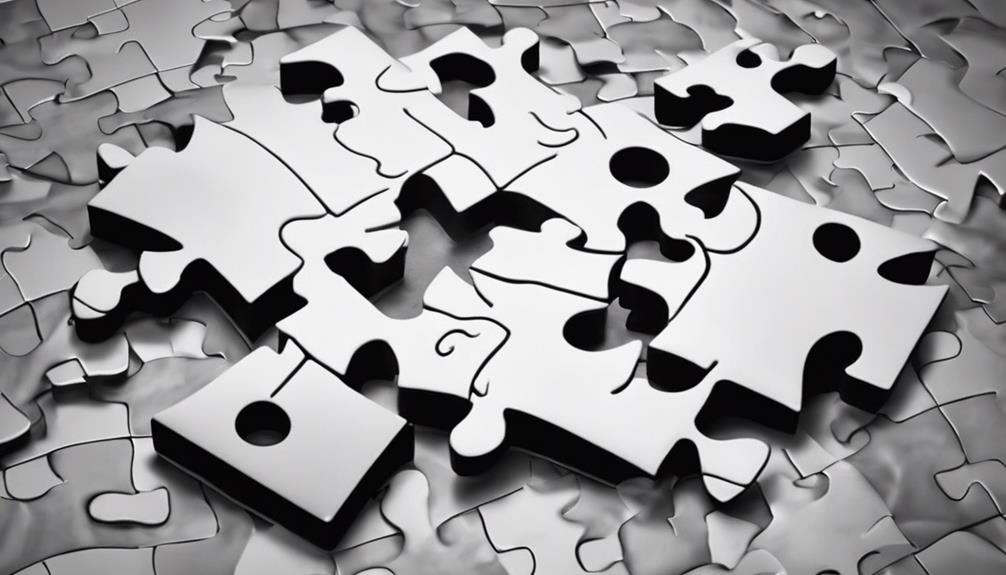We recognize that escaping a codependent relationship may seem insurmountable. Nonetheless, initiating the journey toward regaining your autonomy is essential for your health.
When navigating the intricate dynamics of a codependent narcissist relationship, it's essential to remember that change is possible. By implementing practical strategies and fostering a deeper understanding of yourself, you can gradually regain control of your life and establish healthier connections.
Ready to discover how to break free from this toxic cycle and prioritize your own emotional health?
Key Takeaways
- Recognize signs of codependency and prioritize self-care.
- Establish clear boundaries to protect well-being and self-respect.
- Seek professional help and support to break free from toxic dynamics.
- Embrace independence and self-worth through self-awareness and empowerment.
Recognizing the Signs of Codependency

In recognizing the signs of codependency, we often find ourselves putting others' needs above our own to an unhealthy extent. It's crucial to understand that constantly prioritizing others can lead to feelings of resentment, exhaustion, and a loss of self-identity.
We may feel compelled to fix, rescue, or control those around us, believing that our worth is tied to how much we can help others. This mindset can be detrimental to our well-being and prevent us from establishing healthy relationships based on mutual respect and boundaries.
As we navigate the complexities of codependency, it's essential to recognize the red flags that indicate we may be in a codependent relationship. These signs can include feeling responsible for the emotions of others, having difficulty saying no, seeking validation and approval from external sources, and neglecting our own needs in favor of others'. By acknowledging these patterns, we empower ourselves to break free from codependency and cultivate healthier, more balanced connections.
Establishing Clear Boundaries

Establishing clear boundaries is crucial in fostering healthy relationships and promoting self-respect and autonomy. When dealing with a codependent narcissist, setting boundaries can be challenging but essential for your well-being.
It's important to communicate your limits assertively yet compassionately. Remember, boundaries are about self-care, not about controlling the other person. Start by identifying your needs and values, then clearly express them to the narcissist. Be prepared for pushback or manipulation, but stay firm in enforcing your boundaries.
Boundaries help define acceptable behavior and protect you from being taken advantage of. Practice self-compassion and remind yourself that it's okay to prioritize your emotional health. Seek support from trusted friends, family, or a therapist if needed.
Developing Self-Awareness and Self-Care

Develop a deeper understanding of yourself and prioritize your well-being through self-awareness and self-care practices. It's essential to nurture yourself as you navigate the complexities of a codependent narcissist relationship.
Here are three key steps to help you along the way:
- Reflect on Your Emotions: Take time to identify and acknowledge your feelings. Journaling or talking to a trusted friend can help you gain clarity on your emotions and needs. Understanding your emotional responses will empower you to make healthier choices for yourself.
- Set Aside 'Me Time': Carve out moments in your day dedicated solely to self-care. Whether it's reading a book, taking a walk in nature, or practicing mindfulness, prioritize activities that bring you joy and relaxation. Investing in self-care isn't selfish; it's necessary for your well-being.
- Practice Self-Compassion: Be kind to yourself during this challenging time. Treat yourself with the same empathy and understanding you'd offer a friend in need. Remember that you deserve love and care, especially from yourself.
Seeking Professional Help and Support

Navigating a codependent narcissist relationship can be overwhelming, and seeking professional help and support is a crucial step towards reclaiming your well-being and empowerment. It's essential to remember that you are not alone in this journey, and reaching out for assistance is a sign of strength. Professional therapists and counselors can provide you with the guidance and tools necessary to break free from the toxic cycle and rebuild your sense of self-worth.
In your search for professional help, consider the following aspects:
| Aspect | Description | Benefits |
|---|---|---|
| Therapeutic | Individual or group therapy sessions can help you process your emotions and learn healthy coping mechanisms. | Gain clarity and emotional support. |
| Support Groups | Joining support groups with individuals who have similar experiences can provide a sense of community and understanding. | Feel less isolated and receive validation. |
| Mental Health Professionals | Consulting psychologists or psychiatrists can offer specialized assistance and treatment plans. | Receive personalized care and expertise. |
Embracing Independence and Self-Worth

Let's take a moment to acknowledge the strength and courage it takes to embark on the journey of embracing independence and self-worth after navigating a codependent narcissist relationship. It's a path filled with challenges and self-discovery, but it's also a journey that promises growth and empowerment.
Here are three key steps to help you along this transformative process:
- Rediscover Your Passions: Take time to reconnect with activities or hobbies that bring you joy and fulfillment. Reconnecting with your passions can reignite your sense of self and help you rebuild your identity outside of the relationship.
- Practice Self-Compassion: Be kind to yourself as you navigate this journey. Recognize that healing takes time and it's okay to have setbacks. Treat yourself with the same kindness and understanding that you'd offer a close friend facing a similar situation.
- Set Boundaries: Establish clear boundaries to protect your emotional well-being. Learning to say no and prioritize your needs is essential in reclaiming your independence and self-worth. Remember, it's okay to put yourself first.
Frequently Asked Questions
How Can I Navigate Social Situations Where the Narcissist May Try to Manipulate or Control Me?
In social situations where a narcissist may try to manipulate or control us, it's crucial to set firm boundaries and prioritize our well-being.
We can communicate assertively, stay grounded in our values, and seek support from trusted individuals.
By recognizing the signs of manipulation and standing our ground, we can protect ourselves and maintain healthy relationships.
What Are Some Practical Ways to Rebuild My Self-Esteem and Confidence After Leaving a Codependent Narcissistic Relationship?
When we break free from a codependent narcissistic relationship, rebuilding self-esteem and confidence is crucial.
One way to do this is by surrounding ourselves with supportive and understanding individuals who uplift us.
Another helpful method is to engage in activities that bring us joy and a sense of accomplishment.
How Can I Handle Feelings of Guilt or Responsibility for the Narcissist's Behavior?
When we feel guilty or responsible for a narcissist's behavior, it's crucial to remember that their actions aren't our fault. It's common to internalize their manipulative tactics, but we must recognize that we aren't to blame.
Seeking support from loved ones, therapy, and self-care practices can help us navigate these emotions. Remember, it's essential to prioritize our well-being and set boundaries to protect ourselves from further harm.
What Steps Can I Take to Ensure I Don't Fall Back Into a Codependent Pattern in Future Relationships?
To ensure we don't fall back into a codependent pattern in future relationships, we must prioritize self-care, set healthy boundaries, and communicate our needs openly.
Seeking therapy or counseling can provide valuable tools and insights to help us navigate relationships in a healthier way.
How Can I Cope With the Loneliness and Isolation That Often Comes After Leaving a Codependent Narcissistic Relationship?
We understand how challenging it can be to cope with the loneliness and isolation that often follow leaving a codependent narcissistic relationship.
It's crucial to prioritize self-care, seek support from loved ones or a therapist, and engage in activities that bring you joy and fulfillment.
Can Cheating on a Narcissist Help Break Free From a Codependent Relationship?
Understanding cheating dynamics in a narcissist can be key to breaking free from a codependent relationship. Cheating can be a way to regain power and control over one’s own life. However, it’s important to seek professional support to navigate the complexities of this situation.
Conclusion
As we untangle ourselves from the grips of a codependent narcissist, we must remember our worth shines brighter than the darkness they cast. By setting boundaries and prioritizing self-care, we reclaim our power and break free from toxic cycles.
Seeking support and embracing our independence, we emerge stronger and more resilient.
Let's walk away from the shadows of codependency and into the light of self-love and empowerment. You deserve to be free, and you're worthy of love.









